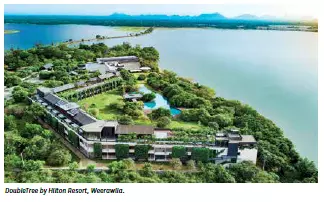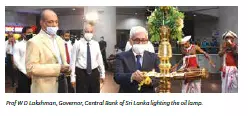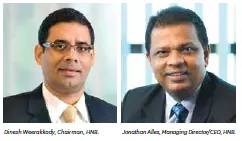Dilith Jayaweera is the Chairman of George Steuart and Co, Derana Media Network, Citrus Leisure and Triad Group of Companies. He thinks differently where creativity and innovation are given priority. He has transformed companies by infusing a dynamic energy that has entailed in good performance. It is always in his nature to keep his neck on the line on behalf of his team and always lead from the front. Dilith Jayaweera is also well-known in the political sphere. He played a pivotal role in ensuring the victory of President Gotabaya Rajapaksa. He prides himself for being out of the system, and does not seek the limelight. He has always believed that ‘Sri Lanka Can’ and, through his actions he shows that he truly believes in the country’s potential. He believes that Sri Lanka should be allowed to unleash its great potential and he is hopeful that the expected momentum will soon be a reality.
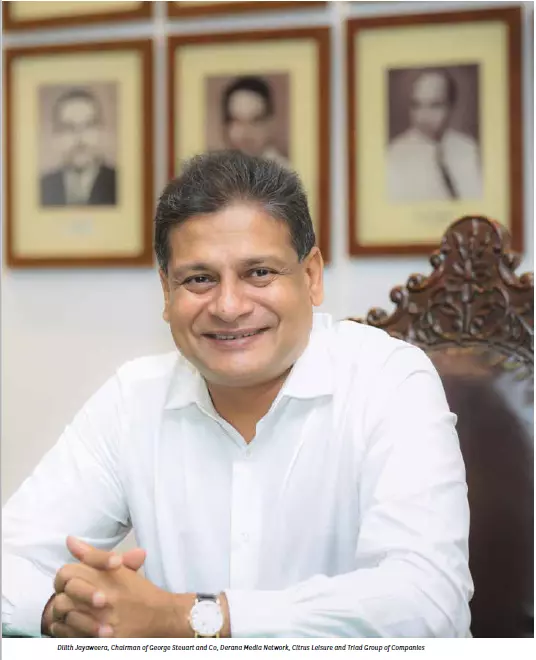
George Steuart was established in 1835 and is the oldest corporate house in Sri lanka. What was your thinking when you acquired the Group?
I am a brand person and my specialty is in building brands. When I became aware that Sri Lanka’s oldest company was available for acquisition, I wanted to acquire the name more than anything else. The truth is we did not even do a due diligence before purchasing the shares. It was only once we completed the purchase of all the shares that we performed a due diligence. The reason was that we were focusing on the name. It is not possible to build a brand to be known as ‘the oldest’. George Steuart had that potential. At the time of acquisition, the company already consisted of successful subsidiaries such as George Steuart Teas, George Steuart Health, and George Steuart Travels. But, they needed some direction, and infusion of new thinking, creativity and innovation. I believe that is my contribution to the Company.
George Steuart is a diversified conglomerate with subsidiaries in almost every sector. can you elaborate on this?
George Steuart and Company first started as coffee planters. It was when they failed in coffee that they moved on to tea. The company owned almost one-third of tea estates in the country. Originally the company was primarily into tea. In the 1970s with the acquisition of tea plantations by the Government through the nationalization policy they were forced to look into other business verticals. Therefore, at the time when we acquired George Steuart and Company it had many of the subsidiaries, it has to date. We have added a few new businesses such as George Stuart Solutions where we focus on trading, engineering services and IT. Even insurance broking, they had as a company but it was dormant. Of course, George Steuart a is very traditional company. We re-energized the subsidiaries more than adding subsidiaries.
George Steuart and Company has always been one of the first five tea exporters of Sri Lanka, at times in the top three. We are a formidable force in the export of tea. It is a very ethical operation. We have many blending facilities across Sri Lanka. Therefore, we wanted to consolidate and invest in our own state-of-the-art blending plant. As we grow our own brands we need to increase the capacity and consolidate. That is why we are building a new plant in Kelaniya.
George Steuart Teas was a leading bulk tea operator at the time I took over as the Chairman of the Company with less emphasis on value added brands. We are currently building our own brands, Steuart Teas and Steuart 1835 and we are becoming stronger while rapidly increasing our international footprint. George Steuart Health was a very successful company when we took over. But after we came into the picture, the Company has grown from strength to strength. We have a diverse range of products in terms of distribution. As I always say I am very proud of these companies because they are very ethical operations. George Steuart Health is doing very well and they are also in the top five pharmaceutical companies in the country.
George Steuart Consumer, George Steuart Laboratories and Seri are three new companies. Through George Steuart Consumer, we do tea sales and we have newly introduced the brand James Coffee. James was George Steuart’s brother and it was in fact James Steuart who had established the first coffee plantation in Sri Lanka. James Coffee is locally blended. Seri is a personal care brand, which we started long before the acquisition of George Steuart. But we brought it under the George Steuart umbrella. Through George Steuart Laboratories we promote the brand Sterill. It is very successful. Citrus was acquired as a separate entity through our holding company before the acquisition of George Steuart. Once Citrus started to perform this too was brought under George Steuart. All the companies are in fact independent but owned by the same parent, George Steuart and Company.
Before you acquired George Steuart, the com[1]pany had a different style of operations. The culture was different. What is your perception?
George Steuart and Company has over the 185 years gone through many shocks. One shock had been when the Government nationalized the plantations. They had of course rightfully ventured into other businesses to survive in the game. But due to the very nature of their structure, the company was not dynamic nor aggressive in its operation. At the time we bought over the Company, the prevalent system was that the directors inherited shares, and there was a protective clause that shares could not be sold to outsiders. And, shares could only be sold to the directors. Thus, shares were being accumulated in this manner. There was no major dynamism in the Company until we went in, bought and secured the transfer of shares. We introduced a very youthful and dynamic approach to the Company. This helped change the Company’s total output. With the acquisition, the Board of Directors had to resign. But, all the other senior staff and subsidiary heads stayed and they are working to date. They are still in charge of their operations. We infused our dynamic thinking, and extra energy into the system. We gave them the freedom to think and implement. Previously the Company structure was regimental, which we changed. They are all free to take decisions at their respective subsidiaries. And, they only report to me at the balance sheet stage, which is at a high level. I do not get involved in their day to day operations, which they appreciate greatly. It gives them a sense of belonging and ownership.
What has been your experience with the ‘new normal’? how has the company adapted?
Currently George Steuart and Company is facing difficulties like any other business. But still for all, due to our diversified basket, the different businesses set off each other. For example, George Steuart Travels is at a standstill. We have inbound and outbound travel business where both are facing difficulty in this current situation. Then in the Citrus Group all three hotels are finding it difficult. Contrary to what people think though Citrus Waskaduwa has been transformed into a quarantine center, it is a very costly affair and it does not bring any contribution. Other subsidiaries such as Tea, Health, George Steuart Labs and Seri are performing at a satisfactory level and are basically keeping the Group afloat.
Future plans for the company?
The Company is to a great extent managed by the second generation even though I am the Chairman. We are grooming and planning the As I always say I am very proud of these companies because they are very ethical operations. George Steuart Health is doing very well and they are also in the top five pharmaceutical companies in the country. 34 BUSINESS TODAY deceMBeR 2020 businesstoday.lk succession process. It is now time for them to take the baton and run the race. I am trying to complete my tenure as fast as possible. The future plans from their point of view would be to look at more lucrative areas especially IT. Because traditional businesses such as hospitality and tea, or pharma may not be the way they look at the future of the Company. They in fact talk a very different language. The Company should be willing to look at new opportunities in the way that they do. I am confident that the next generation of leaders will take the Company forward.
you are well known in the advertising sector and you are also in media. can you elaborate on these aspects of your career as well?
We may be an exceptional company in this country. Triad started as an advertising entity and entered a highly competitive industry. Almost all the advertising companies were changing their share structure to become global operators and multinationals. We stayed local and we wanted to position ourselves as a proud independent agency. We made our brand positioning to be that we are a national agency and we are the only national agency. That formula worked. No agency in Sri Lanka has become as successful as Triad, especially the ones that started at the same time as us. Backward integration worked for us because we were a small and local agency. We were managing only local brands, which was a part of the organizational DNA. There were not many local brands that were willing to set down big money for advertising campaigns so we had to grow slowly and steadily. To expedite the growth, we integrated backwards to provide ad[1]vertising services. During that time printing, color separation and outdoor advertising was considered a novelty. We then ventured into photography, radio and television production, annual reports and others. That entire process came to its cul[1]mination with us owning a television channel, radio channel and then a newspaper. Those were the areas that we were comfortable in. That is how we grew.
If you look at how we found capital or the formation of capital is that we earned money from advertising and as it is a creative industry the margins were good. We invested that money in our other subsidiaries. We could simply multiply the income. We could provide all the services under one roof to our clients. Another clever action that we took was that we made the subsidiary companies independent. Technically speaking they are not subsidiary companies of Triad, but they have common ownership. For example, Printage, they are an independent operation and they had to compete, because we would obtain quotations from three different companies for a project, so they had to provide competitive rates as well. As a result, they had to grow. They could not solely depend on us and their capacity could not be justified to fulfill only Triad requirements. That is how we operated and we always enjoyed the journey.
As I always say we did not go behind the bottom line, we enjoy the journey. We are happy to have more subsidiaries because then we can provide more jobs. That is the thinking we still have to this date. That is the power of this Group. We were approached by many multinational companies at various times and they made very lucrative offers. But we did not want to give in, we strategically stayed out of it. This gave us happiness. Regardless of what others say I still believe we are the most ethical operator.
The people that you have brought in to head your businesses have always been from various fields. What can you tell us about this?
Yes, that strategy has worked well for us. We did not have a single person from another agency for about eight years or so when we started Triad. We had people from various places and diverse fields. They brought in fresh thinking. Derana is the best example, CEO Laksiri is from Elephant House, he was heading the soft drinks section, COO Madhawa is from Multiform, which is a chemical industry. In such a manner all staff except for a few are like that. I also do not have any experience in the television industry, I only know that you can show advertisements. It is that process and the fresh thinking that has made us successful. Many people fail to realize that when you try to bring experienced people, while they bring the experience to the company, they also bring a part of the culture of the previous organization. That can harm the originality of the new organization. Being different has helped us in our journey.
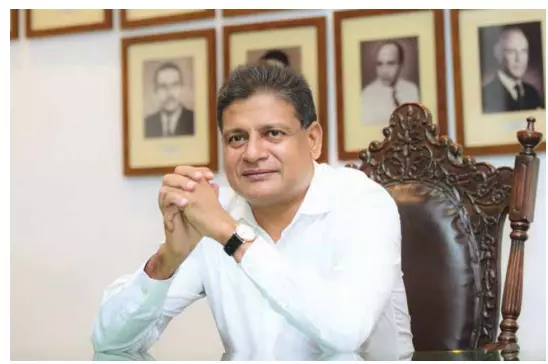
If you look at the advertising and media industry in general. What are your views?
The market can be considered small or big, it is the way you look at it. It is actually creative people like us who can expand the markets. If we say the market it still too small, then there is something wrong. I am speaking in terms of media and communications. I can make my client very aggressive but the competitor has to react, which then in turn expands the market. If my client is number one in a category, but is a lethargic player the market will not grow, but if they are a dynamic player the market will grow because the competitors will react. This would mean more TV commercials, more radio spots, more press and magazine ads, and in this manner all areas will grow. If a market is not growing, then we have contributed to a de-growth. Triad is now 27 years; we have never faced a massive problem in survival because that is how we work with our clients. The role of ad agencies is to make the client grow. You look for opportunities, you do not wait till the client brings a brief. We can always help them to find new opportunities or to challenge the competition in a more aggressive manner. Then the market grows. But when some people complain that means they have not done their job well. If you advise your clients to be innovative in their operations, then you have to be in a more innovative position to offer new and fresh ideas and opportunities and analyze them. It works. After the COVID-19 situation is brought under control, I personally believe that all these industries will show great performance. Because we are being kept tight forcibly. People cannot wait like this, without walking to places or travelling, going to restaurants, or without having fun. Therefore, post COVID-19, every industry will go to the next level.
digital has become more important. What are your thoughts on it role in the modern context?
My view is that digital is a medium on how you are going to take the message to your respective audience. It is a new and less costly medium compared to the traditional above the line, TV, radio and press, and it is more accessible. You must always see how appropriate this medium is for your brand. Why? Because when you say to use social media platforms to promote your brand, you must consider whether it is suitable for a brand. But to build a brand how much time will you spend on an advertisement if you are watching, let say a movie. It is easy to 36 BUSINESS TODAY deceMBeR 2020 businesstoday.lk MR is someone that you cannot dislike. You cannot have any animosity with him. You would not want to see MR lose. It was more on affection and love we had for him especially connected to the war victory. It was not for us to think that MR could lose. I was willing to take the challenge and push him through to the next term though not with the same conviction. skip an ad as that option is given, and you are not willing to waste your time because you want to watch the next scene. It could be even news; it is the same situation.
Digital will challenge the traditional medium like TV but if you are strategic and you can understand the nuances and intricacies of digital media, of course you can use it very effectively. But then you have to use it very strategically. Taking your TV advertisement and playing it on social media is not a solution. You have to be very creative. We have our own digital arm where we do R&D to see how we can engage by using digital media. I believe that it has been given too much emphasis because people still like to be engaged with traditional media. Sometimes it is us, the creative agencies, the media buyers and research agencies that push digital. I believe that this is being pushed disproportionately. Let’s say for example an insurance or banking product, which needs some form of concentration to make a decision. We would not use the phone to make that decision. We would want to read and analyze the content. If you think that a digital advertisement on social media platforms such as Facebook would be suitable, it would not work.
how did you make your businesses successful?
We always believe and I say this all the time, ‘there is no old knowledge, which prevents us to think differently’. That is why when we walk into industries there is nothing that stops us thinking. When we started TV we did not know anything about it. At that time, we did not know that you need a second beta-cam player to play ads. After starting the channel, it was only after about three days that we realized we could not play ads. I still remember we had to hire a second beta-cam player. We did not know anything and the fact that we did not know anything and we did not hire consultants to help us. We were doing all the crazy things and it took the first four and a half years to break even. We were losing big money. We are doing the same experiment with the newspapers.
I love printing and we have always wanted to have a web machine. It was interesting to see that whole operation. But it is only after getting the machine that we realized how complicated it was. Everything is a new learning curve for us, and we learnt. Another example is Pulse that we run on a digital platform. It is our lifestyle platform, which is managed by school leavers. In that way we grow.
you also are well known in the political sphere. can we consider you as a political person?
Yes, you can. I was born into a politically sensitive family. My father was a politically sensitive person. He believed in the concept of communism. In my house the reading material that my brothers and I were exposed to were all translations of Russian books such as Lenin, Trotsky, and Marx. Those were the influences. I was about six years when there was a by-election in my constituency. I remember as a small child I used to go for all the meetings with my father. With the other children in the village I would help them with posters, and drawing wall art and other such activities. That is my background.
Then I went to school and got involved in borderline political activities. I participated in the ‘Panthi Paha’ (five classes) of the JVP. I was almost a JVPer at that time. Then I joined the Colombo University and I was involved in university politics. Many know that I did not attend my lectures because I was involved in full time politics. I did not get involved in national politics at that time. Once I left university I stopped my political activities and we started a business. After that I did not want to get involved in traditional politics. But I am very politically sensitive. It would disturb me to think if I am not politically sensitive. If we all think it is not our job, then it will be in the hands of people with whom we have no control. That is how I have become politically sensitive.
Up until 2004, when President Chandrika Bandaranaike Kumaratunga invited us to do the campaign for the General Election, on principle our agency did not do any politically connected work at all, not even a poster. In 2004, it came as a challenge where it was to be given to either a foreign or a local agency. Our thinking was why should a foreign company come to Sri Lanka to do an election campaign? We took it as a challenge and we did the very successful ‘Rata Perata’ campaign. Immediately after that was MR’s campaign, there again I felt it was my responsibility to do the campaign. The difference is that I do not mix politics with business. There have been instances where our competitors have handled campaigns and then after the elections they have obtained positions in the administration. However, that did not happen in our case. I also businesstoday.lk deceMBeR 2020 BUSINESS TODAY 37 I believe I did my job well. It was my conviction that he could do a better job. To date I have great faith in him, and it is up to him to deliver. Honestly speaking ensuring the victory of GR gave me the biggest satisfaction for my contribution. believed that agencies that became politically aligned and dependent on political connections for business to survive have failed in different ways in my view. We did not want to depend on political work. We were always comfortable in working with privately owned local brands.
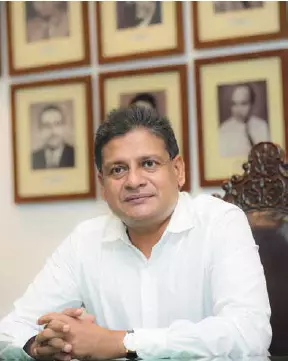
you are one of the main people who worked to bring the current President into power. you have been working with him not just now but from 2006. no one thought he would come into politics. What has been your experience?
One of our proudest achievements is the ‘Api Wenuwen Api’ campaign that we did. I take total pride in that because we managed everything from the strategizing, to conceptualizing, execution and the final outcome. It was not just the idea. We became integrated and part of the delivery. We were almost like the fourth force. After that it was my conviction that the country did not get the best in terms of post war returns. My expectations were very high for Sri Lanka. We made large investments and became aggressive, and ventured into different industries because we believed that post war Sri Lanka would grow at a different pace. Very openly speaking, it did not happen the way we expected. Even in delivery I saw many gaps such as in terms of attracting FDIs for example. One thing that we expected was a major flow of FDIs. We were not successful in delivering the dividends of peace after a 30-year long conflict.
Then when it came to the 2014-2015 election we ourselves were tired and I have never hidden that fact. That tiresome feeling came with the general ethos of the people and the distance that was created by the regime. We all started feeling that. However, I was still willing to take the risk and the challenge and run a campaign to protect the cause, and the continuity of it. Because MR is someone that you cannot dislike. You cannot have any animosity with him. You would not want to see MR lose. It was more on affection and love we had for him especially connected to the war victory. It was not for us to think that MR could lose. I was willing to take the challenge and push him through to the next term though not with the same conviction. By that time things were getting very complicated. But I was willing. However, we did not get the opportunity to run a strategic campaign. I am sad that we did not get that opportunity. There was only about a 200,000 plus gap and from a point of view of strategy and as a communicator I still believe that we could have made a dent and obtained the required votes and taken the government to the next level, but it did not happen. Thereafter my dream product for this country was Gota.
My contribution could only come from strategic thinking and planning, creativity, innovation and implementation in the right direction. I believe I did my job well. It was my conviction that he could do a better job. To date I have great faith in him, and it is up to him to deliver. Honestly speaking ensuring the victory of GR gave me the biggest satisfaction for my contribution. Because it is not like building another brand. We have built many local brands for which we take great pride in what we have done. We are very proud of the value we have added to this nation. But this I would consider as the climax of my personal involvement in the communications industry. Because right through it was a very strategic plan up to the outcome. There are many stakeholders that share the success story and we played our part well in different ways.
Why GR?
It is my belief that if you do not think outside the box, and outside the options, you would always see similar results. Another politician could have been promoted, but it would yet again be a politician. I saw him as a technocrat and I believed the country needed a technocrat because we were tired after more than 70 years where too many options had been tried but the outcome had always been similar. If you want to see a completely contrasting and different outcome you need to have a different solution. I saw this as a completely different option. I am yet to see the expected momentum. I see though we are very ambitious the traditional mechanism of politics and historical practices in the country can reduce the speed. I can see that happening. There is no doubt that people expected things to happen. That is why it is discussed whether he is delivering at the level of that expectation, which is true. GR was pitched at a very high level. The expectations are very high, and that is why at times it makes people unhappy and disappointed. It is managing that expectation and the delivery, which is a challenge. It is a daunting task but the country needs GR at the helm.
Why are you not a part of Government?
We have to identify the areas in which we are comfortable with where we possess the knowledge, techniques and practices. I am not good working within the Government and the political system, which is there now unless it changes. I am best at where I am positioned because I can contribute my thinking, my creativity, my independence while being a successful businessman and corporate contributor. But if I go close to the President and get into the system I am bound to be a failure. That is something I do not want to do, because if I do I might not be able to contribute at this level. I work best when I have total freedom. That is what I think. I am taking a back seat because I have not done or taken anything from businesstoday.lk deceMBeR 2020 BUSINESS TODAY 39 the President personally. The businesses that I am traditionally involved also are being challenged because of my close affinity to the President. It is a sad situation where I cannot get involved even in a normal business that we have been doing for a very long time because that is also being interpreted in a different way.
I do not have the required competencies to be in the system. I am much better at what I do now. I can build factories, introduce new industries and motivate people, all of which I can do from the outside. That is how I can help him, if at all. As you know I do not want to be a traditional supporter of a leader. I am not that. Though it is speculated that I meet him and carry tales, I am not that and I will never be that. I want to maintain my professionalism and also the gap. My contribution should come from a professional perspective. There are many unpleasant examples from the past of people who have got close to them. I want to take pride in the products that we helped create and watch from a far and be a part of it from where you can be good at.
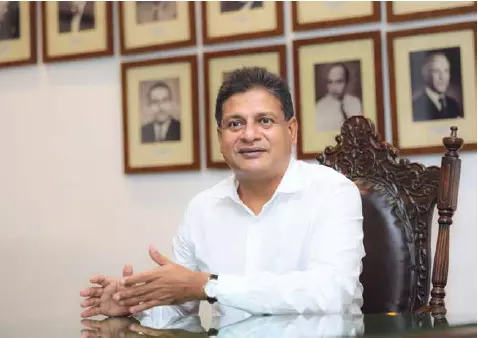
you are different, but many of the private sector are clamoring to get into Government positions. Why is that?
From the way I think there are two reasons for the private sector to get into Government service. One is probably the image, the other thing is that you believe you will have access to Government business and other related opportunities. In my case I do not want any of that. I am a simple man and the image that I want to protect is that I am always the same and have not changed over the years. In my mind I am a simple person, I do not want to be positioned as a big person, who is associated with the President. The second thing is that I do not want any business from the Government because that complicates our style. I am believer of creativity and innovation and you cannot do that being inside the Government. We are better outside than inside. Certain private sector people were handpicked by the President because he believed that they would be able to perform the task and it was for a reason. We must appreciate it that they are using their productive time to serve the people of the country. From a very broader perspective, whether they can survive in the system and still deliver and be happy is yet to be seen. That is my view.
you have been appointed as one of the private sector representatives to the Public Services commission, and you are also a member of the Task Force to protect archaeological sites. What do these roles entail?
There are areas where you feel it is your bounden duty. One area is archaeology; I have always been very sensitive to that because as an island with a history of over 2500-3000 years’ archaeology plays a big role in terms of the country’s ecosystem, and defines our history and culture. In turn that differentiates us from the rest of the world. Our heritage provides economic opportunities such as tourism. And it has immense value, which has to be protected. I was invited to join this particular task force and I accepted. But I have declined many. Even the Public Services Commission is an area that I can contribute to. The country completely depends on the public sector for everything, which we sometimes do not understand or appreciate. But the public sector also needs a major paradigm shift. I do not know whether I can do much but I am hopeful that I can infuse some energy.
We can say that you are a prominent business leader in Sri lanka and influential in the political sphere. In your words who is dilith Jayaweera?
You should ask this question from a school friend and ask them whether they have seen any difference in me over the years. I do not want to change my offering whether it be a friend, teacher or the country. Some of my teachers even when I meet them now they will say that nothing has changed. I can say nothing will change. I may have more money and I can be perceived as powerful but who is Dilith Jayaweera? The one word I would say is that I am the ‘same’. You need to enjoy the journey. The destination does not offer you any happiness. The journey offers you happiness. If you do not enjoy the journey, that is what you do everyday should give you happiness. If you have done wrong things to reach your success it would give you so much of sadness and unhappiness. It is like climbing a mountain, once you get to the top and you look down and what you see should give you happy memories of your journey. If you have compromised your beliefs and ethics and your traditions, your parent’s expectations, if you have compromised all of that and achieved especially in the corporate You need to enjoy the journey. The destination does not offer you any happiness. The journey offers you happiness. If you do not enjoy the journey, that is what you do everyday should give you happiness. If you have done wrong things to reach your success it would give you so much of sadness and unhappiness. 40 BUSINESS TODAY deceMBeR 2020 businesstoday.lk world, then what is the happiness? It is worse than being a beggar.
We do not live in another country we live in Sri Lanka. Our values are different. Our values and achievements have to carry along with the achievements ethics, principles, and beliefs. As much as people will join you at your cocktail for your anniversary it would be everyone’s knowledge on how you got to this point. It is not about what people say because I do not care about what people say or do. But it is what you know inside. You will always have enemies and those who would be envious of you. You cannot fight all those forces then you are just wasting your time. I do not generally even respond unless in extreme cases. That is not what I am saying, it is a feeling.
If you take Triad, our first employee is still with us. He is a happy employee and I am sure he is happy as me. He still calls me Dilith from that day to now. Otherwise there is no point. I am accessible, I am there and anyone can speak to me at any time. That gives me happiness, not the numbers in the annual report or bank balance. I prescribe this to my friends in the corporate and mercantile sectors in Sri Lanka. I cannot say that it is the same in other countries. I am happy. There are many rich people in Colombo who are unhappy. That is because they have not realized this little thing. You must achieve and go for the best, try to be the richest not just in Sri Lanka but in Asia and the world. But your journey is important. Because it is going to give you so much sadness if you have got there in the wrong way. You cannot cheat your heart. However, much publicity you give, it cannot give you that satisfaction. As I always say it is the vision statement not in the boardroom but in the bedroom that is important. It is the one in the bedroom that you have to live with. The vision statement in the boardroom can be a fancy one. But when you sleep in your bedroom that is the vision statement that would keep bothering you. That is the vision statement that would bother you when you are looking within yourself. How many people can be happy of their journey is the question.
you always believed that ‘Sri lanka can’, what is the future?
The potential that Sri Lanka has is enormous. Not many have realized that potential unfortunately. That is why we try to tinker this operation. That is the momentum that we are waiting from the President. The capacity to think due to the very nature of this country is enormous and we need to allow people to unleash their capacity. For them to unleash their capacity they need the environment. If I have an idea, what assurance does the Government gives to me that they will not let me down when I implement it by way of taxes, policies or political influence. I am not referring to any natural disasters or acts of God, which are unavoidable. Every five years something is going to change. If not the party, the person will change. If I want to think huge and get into an industry what is the assurance that they would give me that I would be protected by the country. Why do people hide their success stories? A success story carries so much hardships. Starting from petitions, inland revenue up to FCID level. Therefore, we do not publicize our success. This kind of very low level politics of a country does not give the people the power to unleash their capacity to think new ideas and innovation. How many of the lawmakers understand? If we are allowed to Sri Lanka can be at a different level. But for that Sri Lankans have to be celebrated and cheered on by fellow Sri Lankans.
The people may be sending the politicians to Parliament but the thing is that the Members of Parliament of successive Governments have given insecurity to the nerve center of the nation, which is the corporate world. Entrepreneurs are creative risk takers. They are creative plus they are willing to take a risk, and they can only add value to a country. For them to add value to a nation they should be given confidence. The successful countries in the world have succeeded in doing that. You are as free as you can be to think. We expect the President to create this difference and new environment in the future.
The lack of the cohesiveness has resulted in people going in different directions. It is the Government’s duty to make things cohesive, and regain the team work. They should work on one agenda, plan, and KPIs. We are still hopeful, since the President has secured more powers that he will be able to deliver on the promises he made. This is a more complex expectation and working with a traditional political system it is not easy.
Every morning you must wake up with a positive thought so we are hopeful. We are hopeful that this country will see that opportunity and people will be unleashing their potential. It will be a country that will celebrate great ideas.


